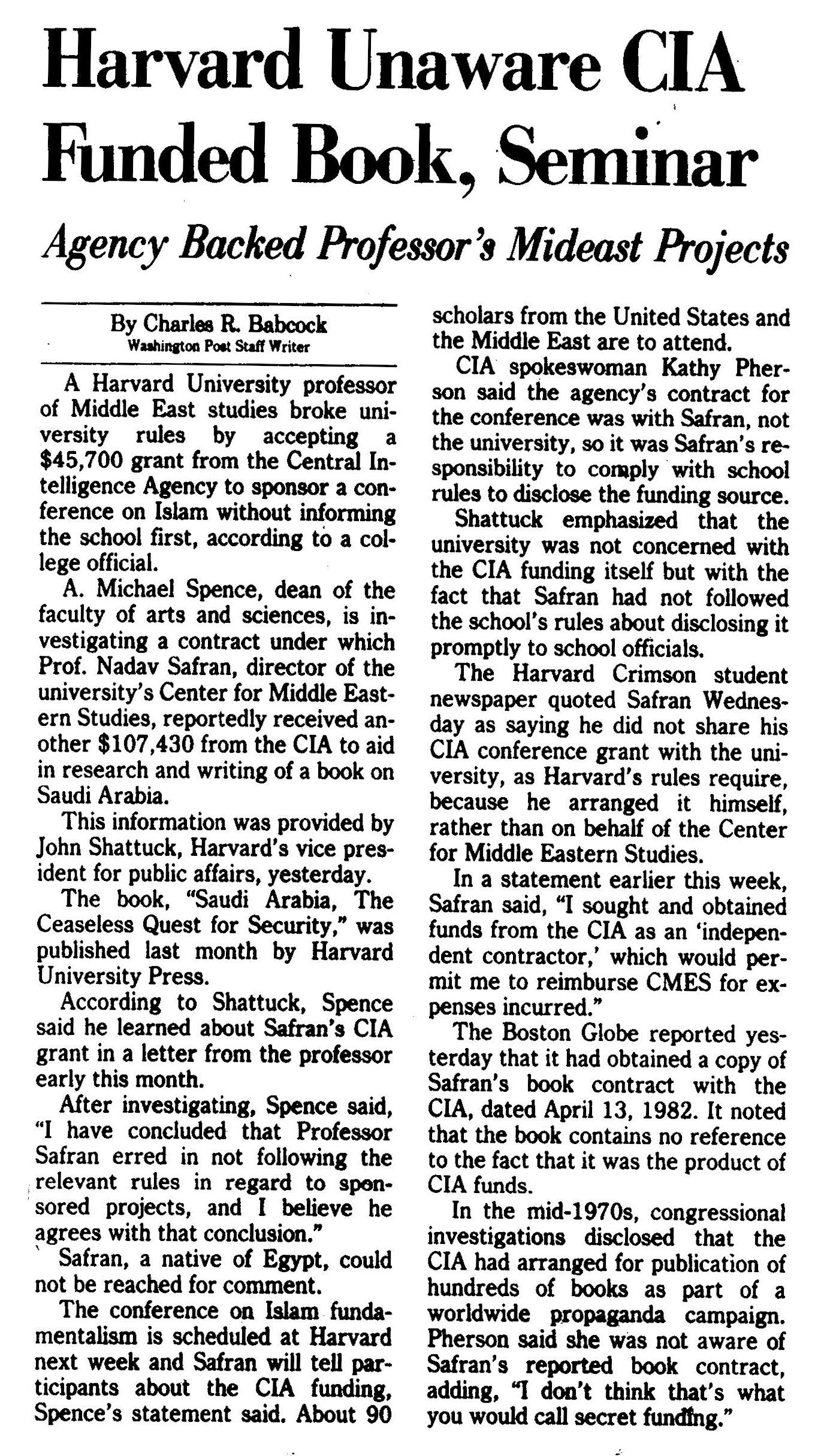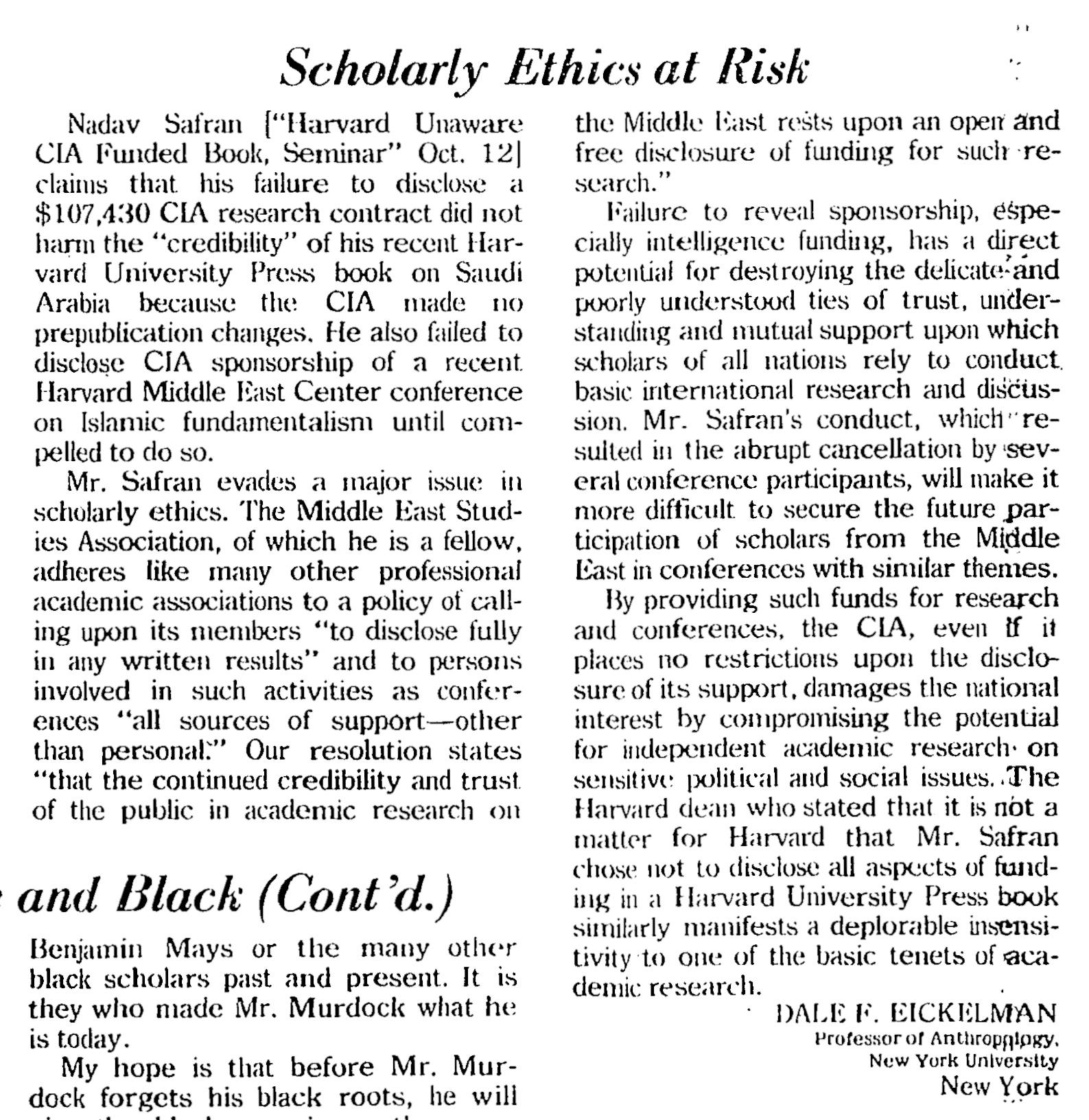<cia.gov/readingroom/document/cia-rdp90-00806r000100020050-3>
The Washington Post, A24, Letters to the Editor, 1 Nov 1985.
<proquest.com/docview/138477151/31691A6752AC414FPQ>
Charles R. Babcock & Dale F. Eickelman
Harvard Unaware CIA Funded Book & A Response
Harvard Unaware CIA Funded Book, Seminar
Agency Backed Professor’s Mideast Projects
By Charles R. Babcock
Washington Post Staff Writer
A Harvard University professor of Middle East studies broke university rules by accepting a $45,700 grant from the Central Intelligence Agency to sponsor a conference on Islam without informing the school first, according to a college official.
Safran, a native of Egypt, could not be reached for comment.
The conference on Islam fundamentalism is scheduled at Harvard next week and Safran will tell participants about the CIA funding, Spence’s statement said. About 90 scholars from the United States and the Middle East are to attend.
CIA spokeswoman Kathy Pherson said the agency’s contract for the conference was with Safran, not the university, so it was Safran’s responsibility to comply with school rules to disclose the funding source.
Shattuck emphasized that the university was not concerned with the CIA funding itself but with the fact that Safran had not followed the school’s rules about disclosing it promptly to school officials.
The Harvard Crimson student newspaper quoted Safran Wednesday as saying he did not share his CIA conference grant with the university, as Harvard’s rules require, because he arranged it himself, rather than on behalf of the Center for Middle Eastern Studies.
In a statement earlier this week, Safran said, “I sought and obtained funds from the CIA as an ‘independent contractor,’ which would permit me to reimburse CMES for expenses incurred.”
The Boston Globe reported yesterday that it had obtained a copy of Safran’s book contract with the CIA, dated April 13, 1982. It noted that the book contains no reference to the fact that it was the product of CIA funds.
In the mid-1970s, congressional investigations disclosed that the CIA had arranged for publication of hundreds of books as part of a worldwide propaganda campaign. Pherson said she was not aware of Safran’s reported book contract, adding, “I don’t think that’s what you would call secret funding.”
Scholarly Ethics at Risk
Nadav Safran [“Harvard Unaware CIA Funded Book, Seminar” Oct. 12] claims that his failure to disclose a $107,430 CIA research contract did not harm the “credibility” of his recent Harvard University Press book on Saudi Arabia because the CIA made no prepublication changes. He also failed to disclose CIA sponsorship of a recent. Harvard Middle East Center conference on Islamic fundamentalism until compelled to do so.
Mr. Safran evades a major issue in scholarly ethics. The Middle East Studies Association, of which he is a fellow, adheres like many other professional academic associations to a policy of calling upon its members “to disclose fully in any written results” and to persons involved in such activities as conferences “all sources of support—other than personal.” Our resolution states “that the continued credibility and trust of the public in academic research on the Middle East rests upon an open and free disclosure of funding for such research.”
Failure to reveal sponsorship, especially intelligence funding, has a direct potential for destroying the delicate-and poorly understood ties of trust, understanding and mutual support upon which scholars of all nations rely to conduct, basic international research and discussion. Mr. Safran’s conduct, which resulted in the abrupt cancellation by several conference participants, will make it more difficult to secure the future participation of scholars from the Middle East in conferences with similar themes.
By providing such funds for research and conferences, the CIA, even if it places no restrictions upon the disclosure of its support, damages the national interest by compromising the potential for independent academic research- on sensitive political and social issues. The Harvard dean who stated that it is not a matter for Harvard that Mr. Safran chose not to disclose all aspects of funding in a Harvard University Press book similarly manifests a deplorable insensitivity to one of the basic tenets of academic research.
Dale F. Eickelman
Professor or Anthropology,
New York University
New York


